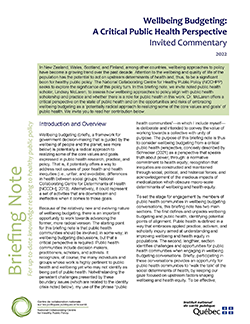Wellbeing Budgeting: A Critical Public Health Perspective
Introduction and Overview
Wellbeing budgeting (briefly, a framework for government decision-making that is guided by the wellbeing of people and the planet; see more below) is potentially a radical approach to realizing some of the core values and goals expressed in public health research, practice, and policy. That is, it potentially offers a way to address root causes of poor health and health inequities (i.e., unfair, and avoidable, differences in health between social groups; National Collaborating Centre for Determinants of Health [NCCDH], 2013). Alternatively, it could represent a set of activities that are downstream and ineffective when it comes to those goals.
Because of the relatively new and evolving nature of wellbeing budgeting, there is an important opportunity to work towards advancing the former, more radical version. The starting point for this briefing note is that public health communities should be involved, in some way, in wellbeing budgeting discussions, but that a critical perspective is required. Public health communities include decision makers, practitioners, scholars, and activists. It recognizes, of course, the many individuals and groups whose work is highly pertinent to public health and wellbeing yet who may not identify as being part of public health. Notwithstanding the persistent challenges presented by these boundary issues (which are related to the identity crisis noted below), my use of the phrase “public health communities”—in which I include myself—is deliberate and intended to convey the value of working towards a collective with unity of purpose. The purpose of this briefing note is thus to consider wellbeing budgeting from a critical public health perspective, concisely described by Schrecker (2021) as a perspective that speaks truth about power, through: a normative commitment to health equity; recognition that inequities are constructed and maintained through social, political, and historical forces; and acknowledgement of the insidious impacts of medicalization which obscure macro-scale determinants of wellbeing and health equity.


